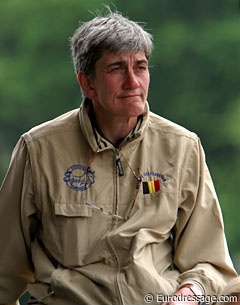
The 2009 European Pony Championships take place from 29 July to 4 August 2009 at the equestrian centre Zilveren Spoor in Moorsele, Belgium. Insiders know that this year a medal is within reach for the Belgian Dressage Pony Team, but many years ago those tables were turned.
In 1997 pony rider Delphine Meiresonne became the European Pony Champion in Le Touquet and one year later she finished fourth at the 1998 Europeans in Hagen, Germany. It was Meiresonne's last year as a pony rider and Belgium's last year of international glory at FEI pony level. Belgian pony dressage was totally stuck in a rut. But these dark years seem to have gone.
Much difference has been made through the commitment and unfailing dedication of the Belgian chef d'Equipe Laurence van Doorslaer. She brought new flair to the position of Chef d'Equipe and created several successful projects and training seminars. Recently, Belgium has been one of the stronger nations at international pony shows.
De Pijpere: When did your career as chef d'equipe start? Do you have a background in horses?
Van Doorslaer: As a child I suffered from polio and had to undergo several operations. The doctor recommended me to do a sport in which you exercise your leg muscles. I chose horse riding. My rehabilitation took years. After a long time I started showing dressage. I bought a four-year old and with the help of Paul Baranowski trained it up to Prix St Georges level. For a while I didn't have a horse, so I took up judging courses with the Belgian Equestrian Federation (KBRSF). I judge tests up to Prix St Georges level and I'm also an eventing judge on a national level. This is how I got in touch with national level organizations. Seven years ago, Belgian pony chef d'equipe Carine Baton-Godfroid resigned and they were looking for a new candidate.
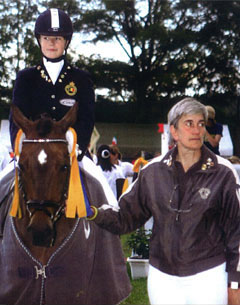 Depijpere: Why did you choose for ponies?
Depijpere: Why did you choose for ponies?
Van Doorslaer: After I had worked for nineteen years as a nurse on a children's cancer ward, I considered it a challenge to build something with children. The good work of Jan Meersman [Belgian chef d'equipe in the 1990s] was slowly crumbling. There was only one FEI pony rider left when I took over the position from Carine.
Depijpere: What's the role description of a chef d'equipe?
Van Doorslaer: The role of a chef d'equipe has never really been described by the federation. In principle, you are asked to be present at competitions with an official nations' cup (CDIO) and at championships. I think that's not enough, because in my opinion we also have to play the role of a "sport educator". The Belgian Equestrian Federation sees me as a nanny and I'm very irritated by that. It shows their lack of respect for me personally and the results I've achieved. Both parents and children who have never been to an international show need to be helped on the scene. Newcomers have to be briefed very carefully so that they get a good basis for the rest of their pony career. This good basis they will take on to the horses. It is my goal to be present at the shows where at least three Belgian pony riders compete. When new combinations compete for the first time, I'll try to be there too.
Depijpere: At the pony shows you are constantly on the move helping your riders. Is that what you mean by "just being there"?
Van Doorslaer: No, as autodidact I've thought about how we can accomplish better results and I've added a few functions to my role as chef d'equipe. I follow my riders year round at national and international shows. It is also very important to do some "scouting". I try to track down new combinations. I also keep track of all results to make a selection for the European Pony Championships. I observe how the riders evolve. Why are the results good, why are they bad all of a sudden? A chef d'equipe has to make sure that the riders are on time at the ring in accordance with the rules. I inform the riders about the rules and administration: the FEI passport, the vaccinations, the measurement test, transport documents, how everything goes at an international show, when to be where... I think a chef d'equipe should always be behind his riders: stand up for them and defend them when there is a discussion. The chef has to encourage them but also be critical when mistakes have been made. You are a representative of your country and your team. When the results are good, I'll make sure everyone knows. Finally I also try to help the riders by organizing national training seminars.
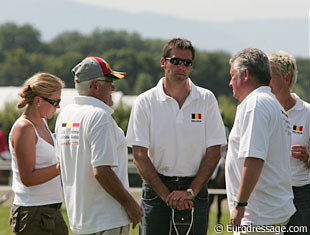 Depijpere: You attracted national and international experts..
Depijpere: You attracted national and international experts..
Van Doorslaer: The first two years we got help from Tineke and Imke Bartels. We organized three-day seminars and a European Championship preparation seminar at Bartels Academy. Tineke has helped me in a phenomenal way and has encouraged me to continue working in a positive way. She gave me the necessary energy to encourage the riders positively. Afterwards, we stayed in Belgium for the training sessions, but besides Belgian international judges we also invited foreign guests. Jan Nivelle from Germany and O-judge Jan Peeters from Holland gave interesting clinics.
Depijpere: Do you also coach the riders on a technical level?
Van Doorslaer: No, not really. Training is not one of my core functions. In Belgium every rider has his own trainer. The chef d'equipe works together with the trainers but also helps when the trainer is not there.
Depijpere: In Germany, the chef d'equipe negotiates on keeping the ponies for the German team. Is that possible in Belgium?
Van Doorslaer: Germany is the it-dressage nation. The best ponies in Germany are not for sale. They moved on to better pony riders to represent the country. I would love that our better ponies would stay with us and be sold to Belgian riders. But when a pony performs well, they are usually sold abroad for a lot of money. But now that the Belgian pony riders are doing so well, Belgian investors might take over these ponies.
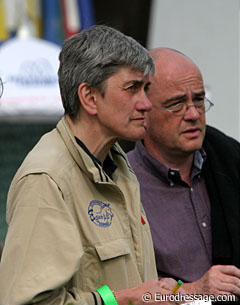 Depijpere: Does a Belgian chef d'equipe have much to say? Can you compare it to the chef d'equipes in Holland or Germany?
Depijpere: Does a Belgian chef d'equipe have much to say? Can you compare it to the chef d'equipes in Holland or Germany?
Van Doorslaer: Both the German and Dutch chef d'equipe are trainers. That's a big difference. Also, here in Belgium a chef d'equipe can only do a team selection proposal to the KBRSF Dressage Committee. The Committee [editor's note: which absolutely does not follow the Belgian pony riders as close as Van Doorslaer does]still decides itself who it will send to the European Championships. The chef d'equipe has no right to decide concerning the EPC.
Depijpere: But all your efforts have paid off. Are you happy with what you achieved the past years?
Van Doorslaer: The goals evolve each year. Each year you have to adapt them to the team you are working with. Four years ago we finished ninth with the team at the Europeans in Pratoni del Vivaro. At that time the goal was to return home with results above 60%. Our goal was achieved. In 2006, Julie van Olst was a finalist with Haasendonks Sultan at the Europeans in Saumur. In the team competition we finished seventh. Two ponies got injured right before we left for France, so we had to in the reserve and could only line up three ponies. Our goal then was a better team ranking. That goal was achieved with one rider in the individual finals as icing on the cake. Two years ago, at the 2007 Europeans in Freudenberg, we had a new team with very young riders. Our goal then was to get an even better team place and to have minimum one rider in the finals. We finished fifth with the team and Julie was seventh in the finals. Jorinde Verwimp finished third and Alexa Fairchild tenth in the consolation finals. Our goal was accomplished again. Last year was the highlight so far! We finished fourth with the team in Avenches (SUI) with 0,2% point difference from the bronze medal! It was painful, even more so because the riders rode really well. We deserved more, but dressage is a judges' sport and we had to accept the points received. But still, it was one place better than in 2007. I hoped for minimum two riders in the individual finals, but we got three in, the allowed maximum, and Julie van Olst won bronze. Jorinde finished eighth and Noemie eleventh. Alexa Fairchild and Neervelds Blamour had to ride the consolation finals and finished second with 69,84%
Depijpere: Your strategy demands much time and effort. What do you get back, besides impressive results?
Van Doorslaer: It does require a lot of energy to do my job well. I can say for sure that the riders and parents as well as the trainers are very grateful for what I do. I think the federation shouldn't complain about the achieved results, though I do feel that they could express a bit more gratitude. When something goes wrong, it's easy to criticize. I think I've already achieved much and I have the right to say so. Ingmar Devos [director KBRSF] and Mariette Withages have expressed their thanks this year when Julie received her bronze medal. It was a real joy for me. If all goes well, the federation has to have the guts to acknowledge that. A positive word gives courage and strength to continue. When you are appreciated, you are ready to do more.
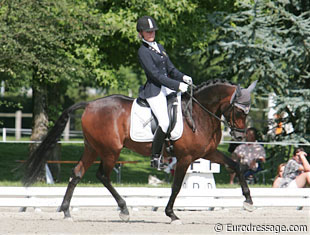 Depijpere: Does a chef d'equipe get paid for his efforts?
Depijpere: Does a chef d'equipe get paid for his efforts?
Van Doorslaer: a chef d'equipe is considered a volunteer, but some expenses for certain shows are reimbursed. I would love to have the expenses covered for hotel and travel to international competitions where at least three Belgian combinations compete. I have proven that there will be results. For years I've put my own money into it. This can't last.
Depijpere: Which combinations are the anchors on the current team?
Van Doorslaer: I think we have a very strong team this year. The four riders who rode at the Europeans last year are still pony riders. The three finalists regularly score above 70%. Alexa was a big surprise in the consolation finals in Avenches. She trained a lot this winter and has acquired a second pony [Ricardo Go for Gold]. But also the younger combinations are on the rise. We only have to decide in June who gets selected. The anchors of our team have learned to ride really precisely. Their precision in test riding has become their strong side. They also have very good concentration skills.
Depijpere: Who are the rising stars for the future?
Van Doorslaer: Leyla Larson, Charlotte Defalque, Geoffrey De Roy and Charlotte van den Eynde are still very young talented riders with good quality ponies. Our future is assured and we have to work on preparing these combinations to take over from the anchors.
 Depijpere: Pony riders are still very much children. Do you have to take that into account?
Depijpere: Pony riders are still very much children. Do you have to take that into account?
Van Doorslaer: These children have to learn to manage pressure and stress. It's not easy. They have to learn to shut themselves off from the outside world and stay focused. I sometimes have to watch out that parents don't transpose their stress onto the children. They are often more passionate than their own children! It has to be fun for the children. I'm very passionate myself and even I have to curb myself to stay calm and relaxed.
Depijpere: How does it go, dealing with the parents?
Van Doorslaer: It's not always as easy but we usually have a very good contact. The toughest moment is definitely team selection. Everyone wants his or her child to make the team. Everyone thinks his child is the best. It's logical. But if a good explanation is provided, everything goes well. The most important thing is trust. So communication is of great importance.
Depijpere: Do you think the Belgian pony riders can achieve individual or team medals this year?
Van Doorslaer: I hope so, both for the team and for the individuals. This year you can win seven medals: one for the team, three for the individual test and three for the kur. It's dangerous to name names now. I don't want to pressure the children. They will have to do their best.
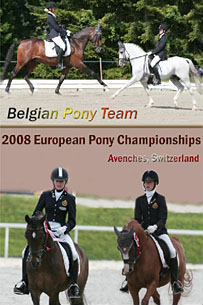 Depijpere: This year the Europeans are in Belgium. Is that an advantage?
Depijpere: This year the Europeans are in Belgium. Is that an advantage?
Van Doorslaer: I hope so, but they'll have to ride for it. Everyone knows that we lost the bronze medal in Avenches. I think everyone is aware of the progress our pony riders made. That can be an advantage. Still I hope that riding in front of your home audience will not pressure them in a negative way.
Depijpere: Are enough pony riders moving on to junior riders level? What are you doing about it?
Van Doorslaer: I think we're on the right track. For years, I've been encouraging parents to buy a horse before their children's pony time is over. Our juniors are slowly making progress. Five of my pony riders have achieved the criteria to compete internationally at junior riders level. Mieke Mommen is one of my older pony riders and she's been doing well for two years now. Jorinde Verwimp, Noemie Goris and Laurence Roos, who are still pony riders, also qualified to ride at international junior riders level. Julie van Olst also has a horse and will definitely make her debut at junior riders level in 2009. This is the best reward a rider can give me.
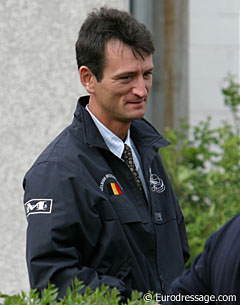 Depijpere: Why don't you expand your responsibility to all youth riders?
Depijpere: Why don't you expand your responsibility to all youth riders?
Van Doorslaer: After Dominique Rimanque resigned as JR/YR chef d'equipe I suggested the Dressage Committee to take on the junior riders as well. I thought it was a good idea to help the pony riders, who turned sixteen, make the difficult transition to horses. Saying goodbye to their pony and getting used to working with a horse is a big transition, both psychologically and physically. It would have been too much to take on the young riders as well and it was my opinion that these riders should find their connection with the senior riders who compete at small tour level. They are also riding the St Georges as a test. The Dressage Committee refused my proposal because they believed juniors and young riders should stay in one group. Cory Verbocht was then appointed JR/YR chef d'equipe.
Depijpere: What are your long term plans. Are you going to continue this?
Van Doorslaer: I've been doing it for almost eight years. I don't make long term plans. I want to do my job with honour and hand over a well performing pony team to my successor. So far I haven't planned on resigning, but I get older every year and no-one knows what a new day will bring. I only want to make sure that I finish with style.
Text by Pieter-Jan de Pijpere for CAP Magazine
Related Links
Coverage of the 2008 European Pony Championships
Belgian Team for 2008 European Pony Championships Announced
Belgian Youth Teams Selected for 2006 European Championships